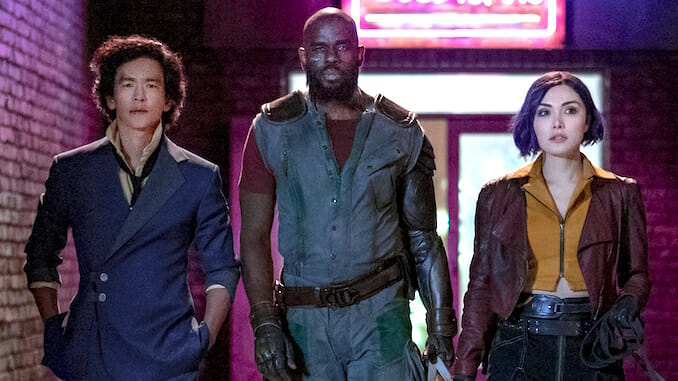Netflix’s Cowboy Bebop Fundamentally Misunderstands What Made the Original So Cool
Photo Courtesy of Netflix
Back in the day, Shinichiro Watanabe’s Cowboy Bebop was an ironclad argument in favor of anime’s coolness, a testament to the power of animation and its ability to tell unique stories other mediums struggled with. It’s since become ubiquitous—Spike Spiegel tees can be found at any local Urban Outfitters, parodies of the opening sequence featuring the Simpsons or the cast of Star Wars practically litter YouTube (including one featured in an official episode of The Amazing World of Gumball), and the anime consistently tops any list of the “best anime of all time,” including our own here at Paste. The show is, understandably, considered a sacred bastion by many fans; it was a gateway into anime for many Millennials who stayed up late enough to catch its maiden voyage on Adult Swim as one of its very first programs.
I’m not a person who feels particularly precious about Cowboy Bebop—it’s a wonderful show and one I’ve watched several times, but I wasn’t groaning with dismay like many when the live-action adaptation was announced back in late 2018. Bebop is a show heavily inspired by Western culture. Its diverse, eclectic blend of musical styles, genre conventions, and multicultural imagery is a huge part of its success outside of Japan, and is something that (or so I believed) could be caught on camera well enough. Seeing the show now, I can’t believe just how wrong I was.
Netflix’s Cowboy Bebop often feels like a slap in the face. Many moments in these 10 hourlong episodes go beyond just your average cringey attempt at recapturing the magic of the source material it’s based on—it’s actively grotesque in its bastardization of the original show, which has been contorted into a full-blown black comedy by writer Christopher Yost, known for his work on Thor: Ragnarok and The Mandalorian. Seeing Yost’s name slapped on the show’s credits contextualizes a lot of the misgivings I have towards it—it’s almost as if, after finding out the original show was animated, Yost decided it must be as garishly cartoonish as possible. The result is a litany of cornball recycled jokes from his previous works and a certain Rick and Morty-esque tone that pervades odiously throughout each episode, rippling towards a staunch insincerity and near-offensive emotional whiplash which verges on the exploitative.
Cowboy Bebop is bloody, and needlessly so. Each episode arguably features more gore than is present in the entire anime. The rampant cruelty on display is also at odds with the jokey tone the show seems to be going for—while mowing down leagues of people, shooting them in gruesome places like the forehead or a supposedly pregnant belly, Spike (John Cho) and Jet (Mustafa Shakir) might quip about lost bounties, their disgust with space meat, or brutalizing their charges, all set to wacky music. One particular instance—a body horror scene involving a tree—felt so out of line with what anyone could expect going into the show (even as a fan of the anime) that it’s a wonder they managed to get it approved.
The buddy cop aspect of the anime is heightened to an extreme here, complete with flat dialogue and childish humor—there’s a lot of “I told you so’s,” petty arguments while being held hostage, and pissing contests among the core trio. Despite decent performances all around, the script renders each character as little more than a short list of comedic personality traits. Faye (Daniella Pineda) in particular lacks a lot of the cunning she displays in the anime, and instead exists for foul-mouthed reactions and awkward “quirky mess” punchlines (she’s disgusted by the taste of water for some reason?) Faye’s love of luxury, conman antics, and touching identity crisis are virtually absent here, or are explored quite shallowly—it seems instead like she’s meant to fulfill a “girl boss” sort of role, shying away from the messier aspects of her character in favor of justifying her actions, as a way to make her seem appealing to a wider audience. Her witticisms and desperation are instead replaced with hollow clapbacks and action heroics.